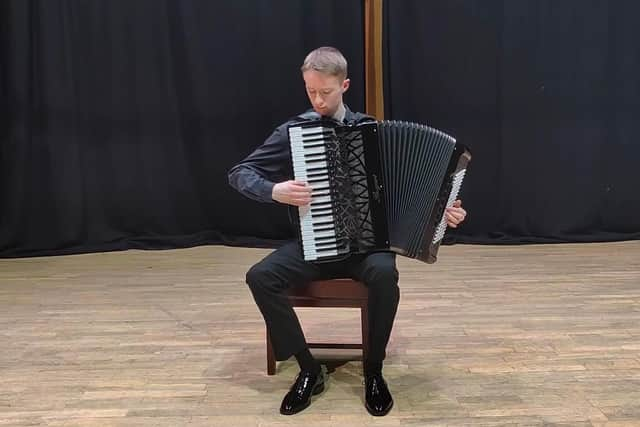The Scotsman Sessions #292: Ryan Corbett
For one of Scotland’s most exciting young musicians, it comes as something of a surprise that Ryan Corbett began learning his instrument without a teacher. Especially when his instrument is one as complex and demanding as the accordion.
"It was kind of a peculiar start,” he admits. “I’d been having lessons on piano and violin, but then I got a loan of an accordion from a family friend. I started playing about Scottish traditional tunes. I won a competition when I was about 14, and my teachers at Douglas Academy Music School thought they should maybe get someone to teach me properly, so that’s when I started lessons with Djordje Gajic. He introduced me to the accordion as a classical instrument, which I had no idea was even possible.”
Advertisement
Hide AdAdvertisement
Hide AdNow in his final year at the Royal Conservatoire of Scotland, Corbett is still studying with Gajic (who’s appeared in his own Scotsman Session with his violinist wife Andrea), as well as performing alongside him in a newly formed accordion duo. Their two-accordion arrangement of Stravinsky’s Petrushka – given its premiere at the Lammermuir Festival in September, and getting repeat performances at the RCS and in Milngavie in December – simply has to be heard to be believed.


Before those concerts, however, Corbett takes part in the final of the Royal Overseas League Music Competition, one of Britain’s most highly regarded contests for young musicians, having raised eyebrows by triumphing over three pianists in the keyboard category. “It’s a good thing for the accordion to be given that exposure,” he admits. “Obviously it’s established as a classical instrument, but I think maybe in this country, it’s got a little bit to go before it’s commonly recognised in that way.”
As for all musicians, the pandemic has been a time of both frustrations and opportunities for Corbett, including an invitation last May to perform in Berlin’s Philharmonie. “It was to play Bach’s Fourth Harpsichord Concerto with the Berlin Symphony Orchestra, but it came at the same time as Germany banned all non-essential travel. I had all the necessary forms, but when I got to Germany, the police at border control informed me that I had to get on the next flight home. I asked them to phone up the concert’s organiser, who had the support of Berlin’s Senator for Culture, who eventually contacted the boss of the boss of border control. Meanwhile I’d been taken in the back of a van with three armed police to a border detention centre. But it made for a memorable experience!” The concert, Corbett explains, finally went ahead, even if with barely enough time for rehearsal.
He’s chosen Scarlatti’s Sonata in F, Kk107, originally for keyboard, for his Scotsman Sessions video – the work with which he’ll begin his Royal Overseas League contest recital. “It links in with the idea of traditional music and classical music. Scarlatti was Italian but worked for much of his life in Portugal and Spain. He was immersed in Iberian folk music, which makes its way into his music, probably more so than with any other composer until much later on.”
A message from the Editor:
Thank you for reading this article. We're more reliant on your support than ever as the shift in consumer habits brought about by coronavirus impacts our advertisers.
If you haven't already, please consider supporting our trusted, fact-checked journalism by taking out a digital subscription at https://www.scotsman.com/subscriptions